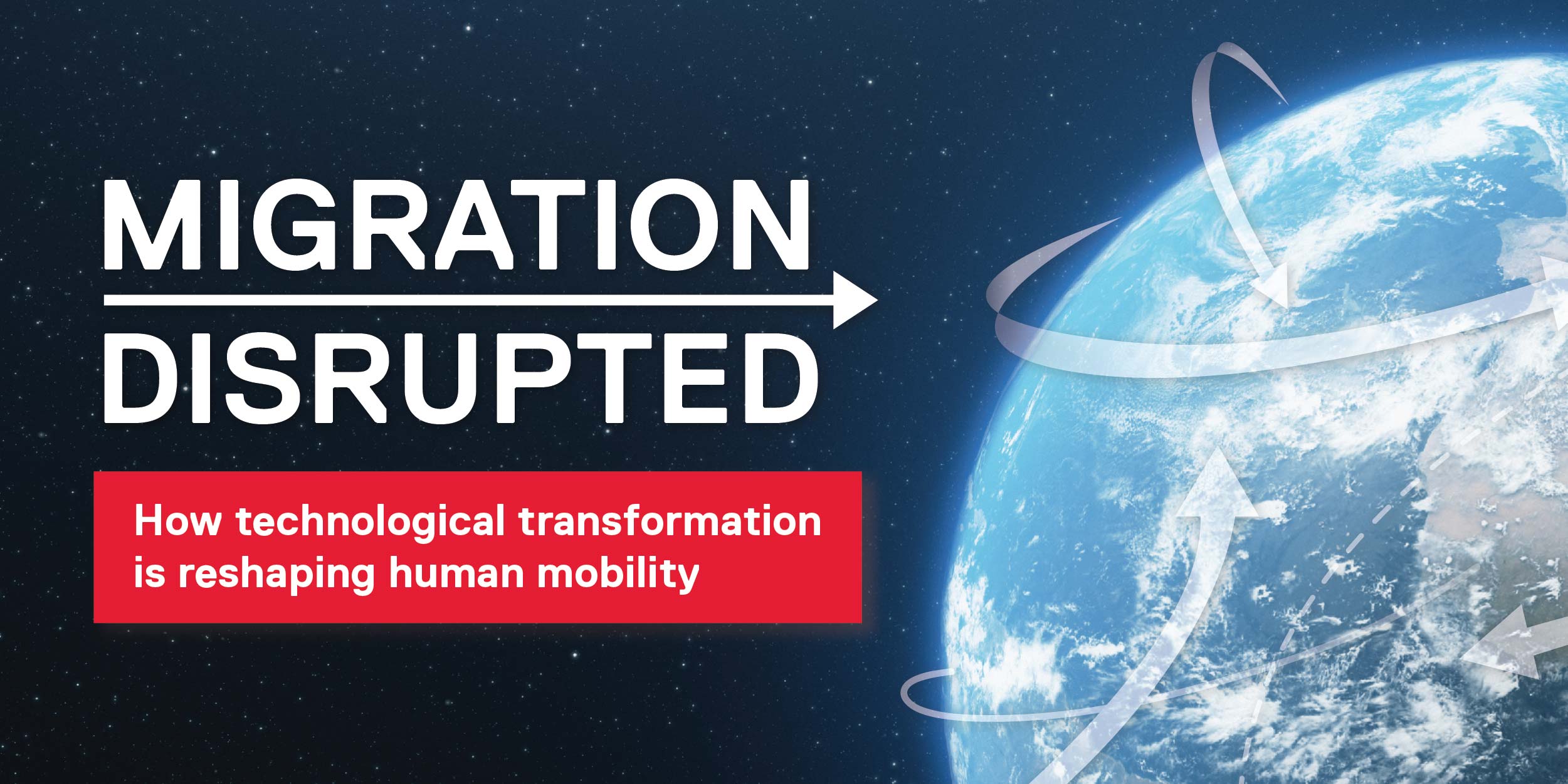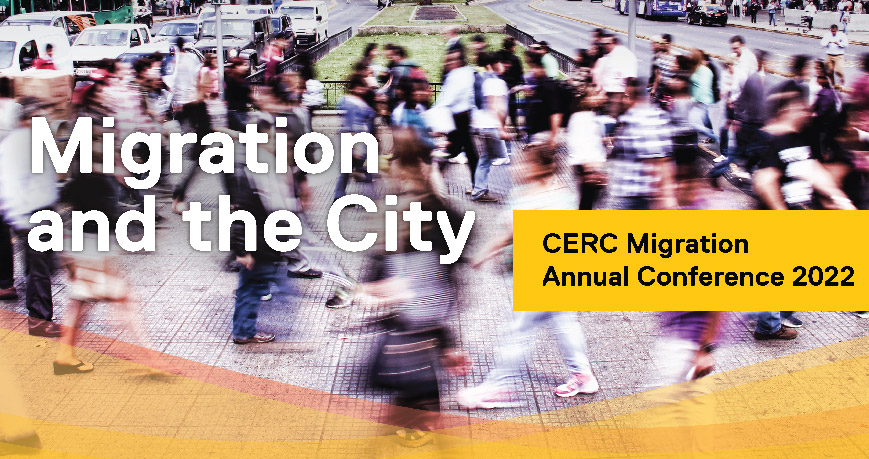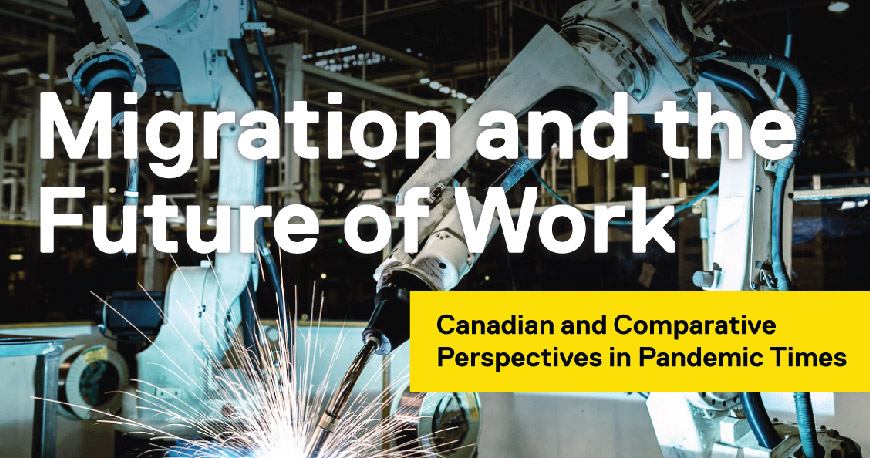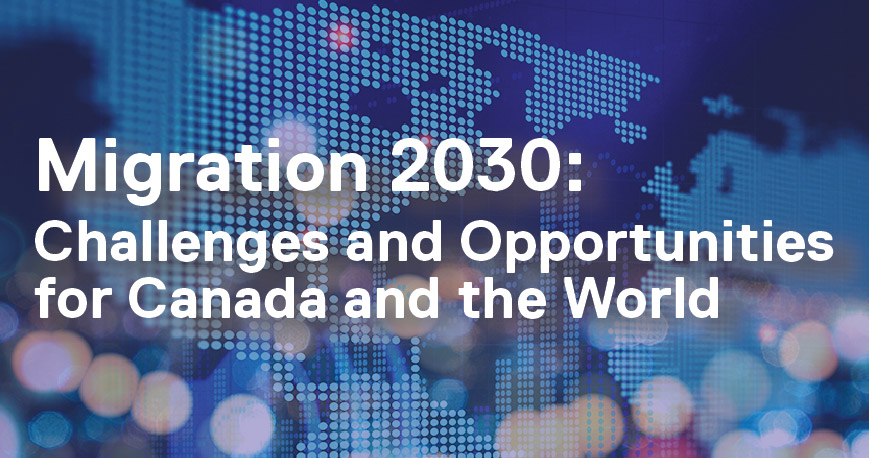A conference organized by TMU research programs CERC Migration and Bridging Divides
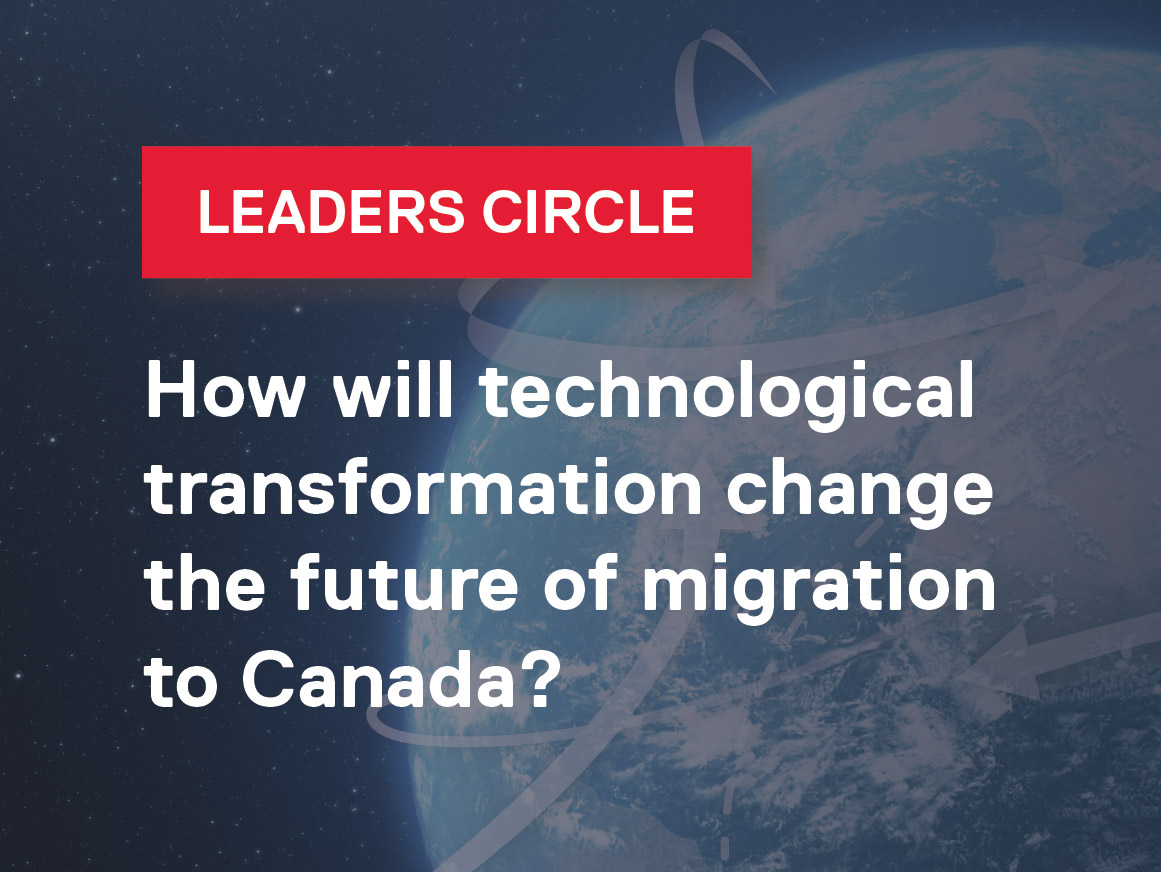
CONFERENCE LAUNCH EVENT
How will technological transformation change the future of migration to Canada?
May 7, 2024, 5-6:30 PM EDT
Reception 6:30-7:30 PM
Overview
Advanced digital technologies (ADTs) are increasingly pervasive in society and the economy both in Canada and around the world, bringing new opportunities and challenges. These technologies are particularly relevant to recently arrived refugees and migrants struggling to find their footing in a new society, and the proliferation of ADTs and their impacts on jobs across the economy also contribute to the structural inequalities that settled migrants and racialized minorities face in their daily lives.
However, new technologies can support the efficient provision of services to new migrants, including employment orientation or language education. They can also open new opportunities for employement, such as entry-level jobs with digital platforms or digital onboarding and remote work opportunities. ADTs facilitate staying connected both locally and transnationally with friends and family. They also provide important channels for social and political participation through online engagement. And yet, these same technologies may create new divides or widen old ones, perpetuating long-term systemic inequities related not only to immigration status but also to race, ethnicity, class, religion, gender, sexual identity, age, education, language, profession or place of residence. Digital literacy, language skills and access to high-quality Internet and smart devices differ significantly among different populations, while ADTs and related algorithms (e.g., for service provision or recruitment) incorporate past data usage and risk perpetuating negative biases. Information technologies may also have polarizing impacts on civic and political participation; while they may facilitate communication and engagement, they cant also create echo chambers and fuel division and even extremism.
This conference brings together an interdisciplinary and inter-sectoral group of researchers and leaders from Canadian and international civil society, business and government to reflect on the implications of the rapid development of ADTs for migrant integration in Canada and around the world. Our kickoff panel on May 7, 2024, will ask how technological transformation will shape the future of migration in Canada, and our four plenary sessions on May 8 and 9 will engage four main themes:
- Who belongs? How do ADTs impact migration, citizenship and democracy?
- Help or hindrance? What potential do ADTs have to address the inequities of health care in Canada and around the world?
- How can social and technological infrastructures shape the experience of migrant integration and foster inclusive cities?
- What is technology’s promise for the future of migrant workers?

About the conference
The conference is co-convened by Anna Triandafyllidou, Canada Excellence Research Chair in Migration and Integration, and Ebrahim Bagheri, Canada Research Chair in Social Information Retrieval and NSERC Industrial Research Chair in Social Media Analytics, both are with Toronto Metropolitan University and are the scientific co-directors of Bridging Divides.
In the spirit of collaboration and to create maximum opportunities for learning and networking, this year’s conference features a mix of panel discussions, audience Q&As, fireside chats, and time for group reflection at your table.
Program
Tuesday, May 7, 2024
Wednesday, May 8, 2024
| Time | Event |
| 8:30-9 AM EDT | Continental breakfast |
| 9–9:30 AM EDT | General welcome: Anna Triandafyllidou and Ebrahim Bagheri, Toronto Metropolitan University |
Session 1
| 9:30–11:15 AM EDT | Roundtable: Who belongs? How do ADTs impact migration, citizenship and democracy? |
Chair: Mireille Paquet, Concordia University Co-chair: Shiva S. Mohan, Toronto Metropolitan University Speakers: Ricardo Baeza, Northeastern University; Ana Beduschi, University of Exeter; Anatoliy Gruzd, Toronto Metropolitan University; Munmun De Choudhury, Georgia Institute of Technology; Yasmeen Abu-Laban, University of Alberta The rise of ADTs opens up new possibilities for migrant civic and political participation, but also introduces new challenges. ADTs can help migrants connect with informal groups and expand their social networks, and the technologies can even facilitate access to formal structures of political participation through online policy consultations or town halls. On the other hand, ADTs, and particularly social media, have been shown to foment societal polarization and divisive politics, which may relate to domestic as well as transnational issues, even transposing homeland politics in virulent ways. This panel will discuss the main advantages that ADTs bring to enhancing migrant civic engagement and democratic participation, and it will also explore the risks involved in a world of transnational chatbots and invisible digital surveillance. |
|
| 11:15–11:30 AM EDT | Coffee break |
| 11:30 AM–12:30 PM EDT | Fireside chat: Artificial intelligence for the social good Speakers: Ebrahim Bagheri leads the conversation with Foutse Khomh, Polytechnique Montréal, and Mark Daley, Western University Co-chair: Radin Hamidi Rad As artificial intelligence methods are finding their way into the realm of immigration and migrant integration, it is vital that we address their ethical and legal implications. On the one hand, the use of AI has been reported to have perpetuated discrimination, exacerbated inequalities, violated human rights, disrupted democratic processes, and more. Yet, on the other hand, AI has improved the speed of border processes and visa applications. Drawing from the UNESCO Recommendation on the Ethics of AI, this fireside chat will consider the ethical, moral and legal aspects of the use of AI technology, asking "how can we ensure AI will be deployed responsibly, and in a way that upholds the rights and dignity of migrants everywhere?" |
| 12:30–1:30 PM EDT | Lunch |
| Oakham House |
Session 2
| 1:30–3 PM EDT |
Roundtable: Help or hindrance? What potential do ADTs have to address the inequities of health care in Canada and around the world? |
Chair: Josephine Wong, Toronto Metropolitan University Co-chair: Georgiana Mathurin, Toronto Metropolitan University Speakers: Marla Asis, Scalabrini Migration Centre; Andre Renzaho, Western Sydney University; Elizabeth Saewyc, University of British Columbia; Karen Soldatic, Toronto Metropolitan University ADTs have revolutionized health care over the past two decades. Their implications have moved beyond computerized billing and accounting to innovations in many aspects of care delivery. Sophisticated devices are bringing services to remote areas, enhancing real-time diagnosis and treatment and enabling drone-delivery of medical supplies. At the same time, advances in AI are leading to dramatic improvements in disease identification and more precise views of population health. While technological progress promises to improve quality of life, there are concerns about the actual effectiveness of ADTs and their ethical use, particularly whether they lead to positive outcomes for all. This panel will discuss the necessary conditions for turning ADTs into a support for equitable access to health care and for promoting migrant well-being. |
|
| 3–3:15 PM EDT | Tea break |
| 3:15–4:15 PM EDT | (PDF file) Breakout discussion tables - Digital inclusion in newcomer integration In person only Participants will join a facilitated small group discussion to exchange ideas from diverse perspectives and experiences. |
| 4:30 PM EDT | Reception |
| 5:30 PM EDT | Conference dinner at Oakham House |
Thursday, May 9, 2024
| 8:30-9:15 AM EDT | Continental breakfast |
Session 3
| 9:15–11 AM EDT | Roundtable: Migration and inclusive cities: How can social and technological infrastructure shape the experience of integration? |
Chair: Sandeep Agrawal, University of Alberta Co-chair: Jérémie Molho, Toronto Metropolitan University Speakers: Cathy Yang Liu, Georgia State University; Gil Penalosa, 8 80 Cities; Geoffrey Rockwell, University of Alberta; Zhixi Zhuang, Toronto Metropolitan University Well-organized social and technological infrastructure can significantly affect how services are delivered, the organization of workplaces and social networks and how a community welcomes newcomers. This roundtable, comprised of Canadian and international urban and housing scholars, practitioners, advocates and activists, aims to stimulate debate on how and, more specifically, what social and technological infrastructure impacts newcomers’ integration in Canadian cities, with special consideration of the relative deficit found in small urban settings and how it might not only inhibit integration but also detract newcomers from settling in such places. |
|
| 11–11:30 AM EDT | Coffee break |
| 11:30 AM–12:30 PM EDT | Lab innovations: Chair: Sophie Yohani, University of Alberta Co-chair: Radin Hamidi Rad Speakers: Presentations from Bilal Farooq and Ali Mazalek, Toronto Metropolitan University eXtended Reality and Digital Twins in Migration Behaviour Studies: Lessons from Travel Demand Modelling At the Laboratory of Innovations in Transportation (LiTrans), we have pioneered the use of eXtended Reality (XR) and Digital Twins (DT) to understand human travel behaviour when faced with novel and emerging future choices, e.g., automated vehicles. Building upon our experience in travel demand modelling, we will make a case that XR and DT have the potential to be very useful tools for systematically studying the behaviour, preferences, and decision-making processes of individual migrants. With the example demonstrations of neighbourhood and walking preferences, we will discuss the opportunities, challenges, and limitations associated with these novel tools. Grasping Migration: How tangible and embodied media can support data-driven discovery Tangible and embodied interaction approaches can offer powerful opportunities to re-think the way we engage with and construct knowledge in a data-driven world. TMU’s Synaesthetic Media Lab has been exploring the design and application of these techniques in diverse fields. This talk will highlight the lab’s ongoing research and prototype systems that support collaborative sensemaking around complex datasets, with a view toward how these approaches can be applied in migration research. |
| 12:30-1:30 PM EDT | Lunch |
| Oakham House |
Session 4
| 1:30–2:30 PM EDT | (PDF file) Breakout discussion tables - Reflections for the future In person only Participants will join a facilitated small group discussion to exchange ideas from diverse perspectives and experiences. |
| 2:30–2:45 PM EDT | Tea break |
| 2:45 –4:15 PM EDT | Roundtable: What is technology’s promise for the future of migrant workers? |
Chair: Rupa Banerjee, Toronto Metropolitan University Co-chair: Nick Dreher, Toronto Metropolitan University Speakers: Wendy Cukier, Toronto Metropolitan University; Jean-Christophe Dumont, Organisation for Economic Co-operation and Development; Suzanne Huot, University of British Columbia; Shamira Madhany, World Education Services; Joel Martin, National Research Council Canada Technological advancements have the potential to revolutionize newcomers' labour market outcomes by offering innovative solutions to the challenges they face. From AI-driven job-matching platforms to virtual skill-development initiatives, technology not only facilitates smoother integration but also addresses the evolving demands of the future workforce. The impact of technology on the future of work is palpable, with automation, artificial intelligence and digitization already influencing job structures and skill requirements. For migrant workers, adapting to these technological shifts is becoming crucial for navigating the Canadian labour market. This panel will examine the ethical considerations, potential biases, and the digital divide, asking whether the promises of technology in the future of work will materialize equitably for all participants including migrant workers. |
|
| 4:15–4:30 PM EDT | Concluding remarks |

